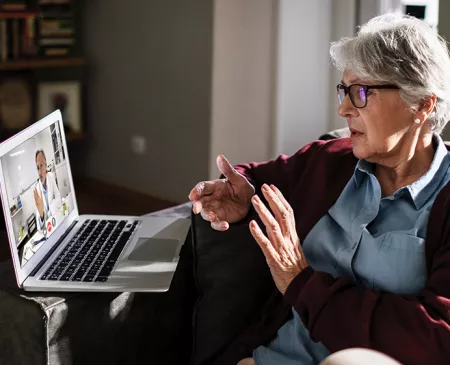COVID-19 Update
The Buzz This Week
For many, the pandemic has impacted nearly every part of daily life for the last two years. Even for those who have avoided the physical effects of the disease, the mental and emotional toll of the pandemic has been substantial as people have dealt with the loss of loved ones, an increased burden of caregiving, lessened social connection, increased addiction and substance abuse, and many other traumatic issues.
In many ways, from an emotional standpoint, the early days of the pandemic were easier because there was a shared experience, clear short-term goals, and limited choices—restaurants closed, hospitals stopped elective procedures, many schools and workplaces shut down. Now, Omicron cases continue to fall, yet there are still nearly 90,000 new cases daily in the U.S. As of February, 65% of the country had received their initial full vaccination regimen, yet less than 30% had received a booster. We do not know when and if the next variant will emerge and how contagious or damaging it may be. People are anxious to return to certain aspects of their daily life but face complex new problems and questions about what is safe and how to make decisions that best protect them. The only thing that seems to be certain is uncertainty, and as states relax mask and proof-of-vaccination mandates, there is yet another burden causing burnout in the form of decision fatigue.
Why It Matters
As Year 3 of the pandemic approaches, there continues to be overwhelming data emerging about the pandemic’s impact on mental health. Vaccines have been able to drastically minimize the physical effects of the virus, but relieving the emotional toll requires more complex solutions.
With decision fatigue, though the problem is well-documented and acknowledged, experts are not all in alignment on the best path forward or methods for overcoming the anxiety it causes. Some suggest setting rules (for example, “I will not dine indoors”) to help remove unnecessary choice so decisions are less overwhelming with fewer options, as well as removing the pressure to make the best decision and accepting that a good decision is enough. Yet others say flexibility is key, and that much like with COVID-19 virus, new information can lead to a different set of choices, so it’s O.K. for one’s standards to change if there is updated data to support it.
Where experts do agree is that building mental healthcare into primary care and recognizing that both mental health and physical health contribute to overall health is also a vital step. A 2021 report from the National Academy of Sciences, Engineering, and Medicine found that inclusion of mental health in medical visits improved outcomes and quality for overall health. It remains uncertain if a new variant and wave will follow Omicron, but mentally preparing for multiple scenarios and addressing mental health concerns with providers now will help in the long run no matter what happens.
Related Links
HBR
We Need Time to Rehabilitate from the Trauma of the Pandemic
KHN
Ready for Another Pandemic Malady? It’s Called “Decision Fatigue”
The Atlantic
Post-Omicron Life Can Be Downright Maddening







